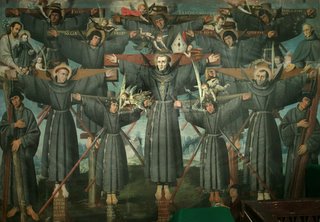
Japan in the middle ages were considered progressive in areas of trade and the arts, as it was Japan that claims it produced the first written novel by Murasaki Shikibu. Also due to Chinese influence the Japanese became proficient in weaving, metal work and tanning as well as building ships, as trade was essential for the survival of this Island nation.
This was also a country of contrast in that Buddhism gained ground alongside the austere beliefs of the samurai, which embraced a feudal lifestyle, of at times extreme asceticism. This worked well when combating the invasions by the Mongols under the leadership of Kublai Khan. But Christianity for the most part was still not incorporated into the Japanese culture, but this would change when Japan became open to foreign trade.
The Christian Faith came to Japan around the sixteenth century, led by the Jesuits most especially Saint Francis Xavier. It would be Francis Xavier who would bring the Word of God to this nation of feudal war Lords, and the people who lived by the Samurai legends. And it would be Francis Xavier who would lay the ground work of preaching the Catholic Faith from Kyushu to Kyoto.
For the first few years this mission of Francis Xavier worked well, as the leaders of these regions allowed certain liberties to the non assuming Jesuits. But a close eye was kept on the Priests in case of trouble, but the skills of Francis Xavier must have been great to ease any concerns which the leaders of these regions may have held.
And as Francis preached the Word of God and the Salvation found only through the Catholic Church, there were many who were baptized into the Catholic Faith, as the first Church would be built in 1576 in Kyoto. But whereas the European way of worshiping was acceptable by some it was seen by others a threat to their own sense of Japanese culture and traditions.
So even though things began well under the guidance of Francis Xavier they would soon disintegrate when the Franciscans also came to Mission in the island nation that is Japan. Many of the leaders known as Shoguns, such as Toyotomi Hideyoshi and Ieyasu Tokugawa began to feel threatened by the missionaries and also with Christianity itself.
One of the Japanese men who had converted to Catholicism became known as Paul Miki not only did this courageous man convert he also entered the Religious Order in hopes of becoming a Priest, where he had hoped to serve the rest of his days pronouncing the good news to his fellow man in service of the Church.
This man was unusual in that he was of noble birth, and his both his parents had converted to Christianity, it was his parents who encouraged the young Paul to study with the Jesuits, in order for him to become one of the first Catholic Priests. Paul was a gifted speaker and spread the joy of the Good News to all who would listen and many of his fellow countrymen did just that as some converted to Catholicism. But it seemed Paul was too eloquent to the Shoguns displeasure!
And so it was that Toyotomi Hideyoshi outlawed Christianity, which then began many years of persecutions for the Converted Catholics in the region including Paul Miki. And though Shogun Hideyoshi ordered a decree banning speaking about Christianity neither Paul nor the Jesuits followed it. This flouting of his orders enraged the power hungry Hideyoshi, which would have dire consequences for the Catholic converts.
And though they faced enormous risks the Priests with Paul included continued to preach the Gospel and to encourage their listeners to embrace the Catholic Faith, and though Paul was not yet a Priest many of his fellow Japanese listened to him. They did this with full knowledge that it could cost them their lives, but Paul and the Jesuit Priests had a higher calling and that was to serve God for the Salvation of souls unto death!
Both Shoguns Toyotomi Hideyoshi and Ieyas Tokugawa, would show outright ruthlessness when dealing with the Christian influence and in their persecution and torture of Christians and Priests, these two leaders showed no mercy to anyone!
And so it came to pass that Paul Miki with two friends would be tortured, as their ears were chopped off and other tortures were suffered by these heroic men as they were paraded through the streets to warn others of the folly of following the Jesuit and Franciscan Priests.
And though Paul Miki alongside both Priests and Christian converts would pay the ultimate price for their Faith, their heroism and courage have not been forgotten. These courageous souls gave their lives so that all men could be saved, and though the Church in Japan would be driven underground for many years, the memory of the heroic virtues of the first Christians in Japan is their lasting legacy!
Paul Miki and his companions died in 1597.
Saint Paul Miki and his fellow Martyrs were canonised in 1862 by Pope Pius IX.
Peace of Christ to ALL
Copyright © 2006 Marie Smith. All rights reserved.